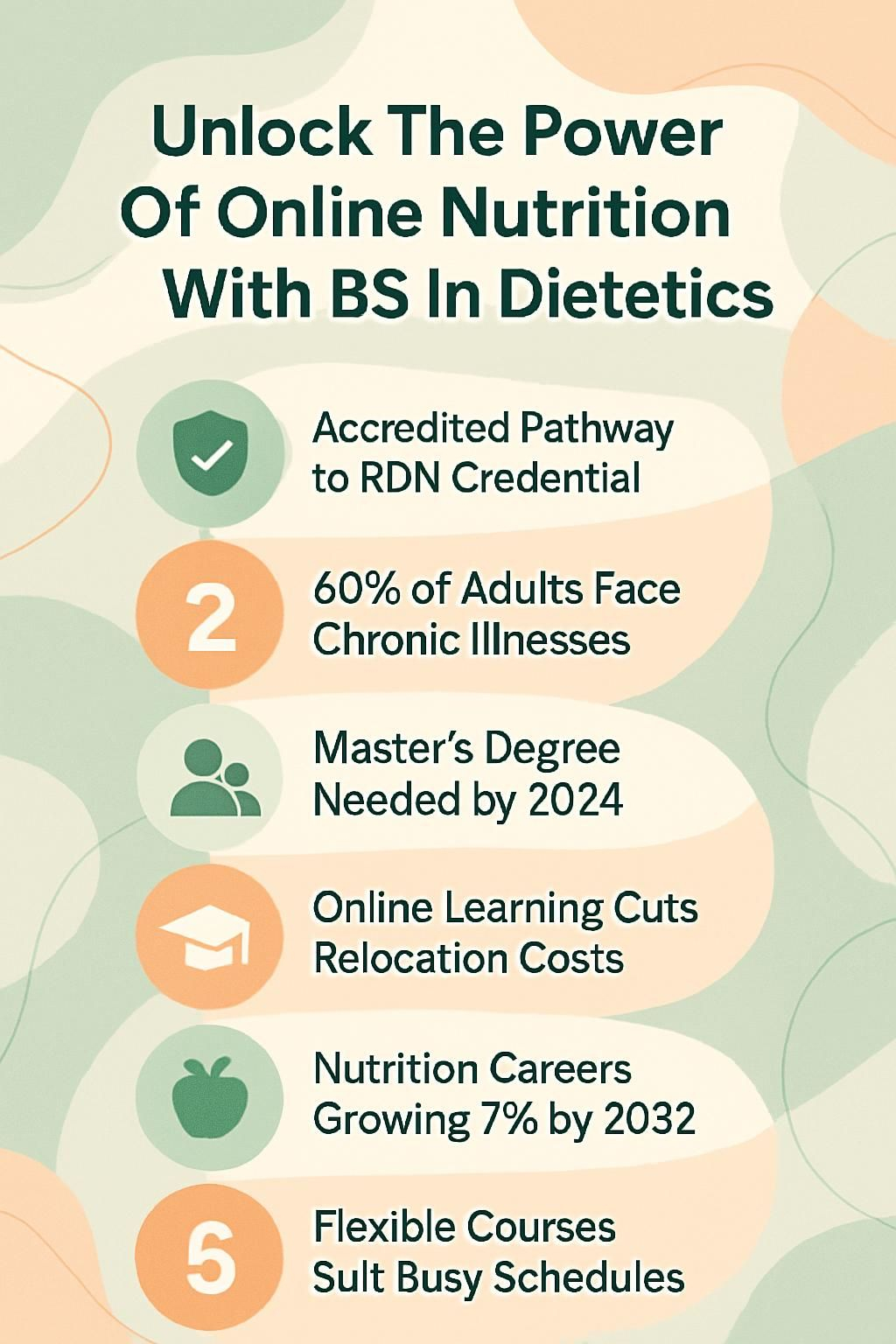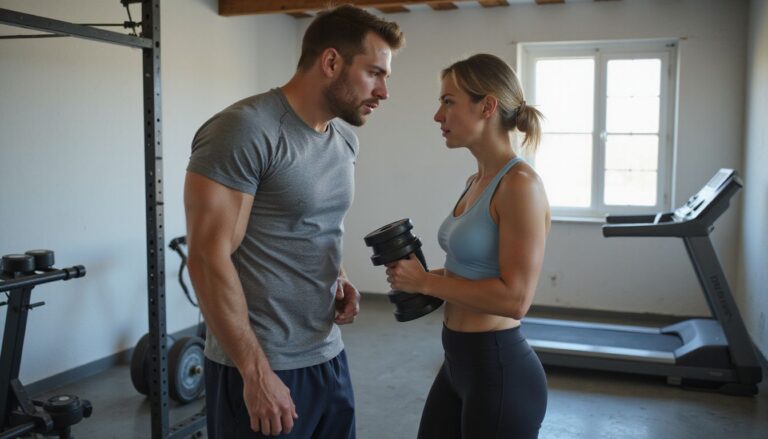Unlock The Power Of Online Nutrition With BS In Dietetics
Our Nutrition Assistant AI Suite will transform your body. You will lose fat, get toned, and build muscle. Gain confidence and optimal health.
If you struggle to find clear nutrition advice, you are not alone. Online nutrition courses let you learn food and nutrition facts from science-based programs at your pace.
You will see how a Bachelor of Science in Dietetics builds real job skills through online learning. This degree can open new doors and reshape how you view healthy eating; keep reading to learn more.
Key Takeaways
- Accredited online BS in Dietetics programs, such as University of Arizona Online at $525 per credit, prepare you for the Registered Dietitian Nutritionist (RDN) path required after January 1, 2024.
- Students build skills in medical nutrition therapy, food service management, and evidence-based counseling, which supports care as 6 in 10 Americans live with chronic conditions (CDC).
- To become an RDN, complete an ACEND-accredited program, earn a master’s degree after January 2024, finish at least 1,000 supervised practice hours in a dietetic internship, and pass the CDR exam.
- Flexible online courses help working adults and military learners access accredited programs worldwide while saving on relocation and housing compared with campus study.
- Career paths include clinical nutrition roles in medical centers or schools and wellness consulting jobs projected to grow about 7% from 2022 to 2032 (BLS).

What is a BS in Dietetics?

A BS in Dietetics is a science degree focused on nutrition and dietetics. It prepares you to study human nutrition, food service, and wellness using evidence-based methods.
What does a BS in Dietetics degree cover?
You study nutrition science through courses in medical nutrition therapy, community nutrition, food service management, and counseling. Many programs include NSC 425 and 435, Medical Nutrition Therapy I and II.
You may also take NSC 422, Weight Inclusive Counseling, and NSC 458, Food Service Management. These courses teach disease prevention, clinical nutrition, food safety, menu planning, biology basics, and patient education.
The curriculum builds hands-on skills in meal assessment and counseling based on research. You also learn macronutrients and micronutrients and how they affect human health.
Programs often meet Accreditation Council for Education in Nutrition and Dietetics (ACEND) standards. That way, your training supports RDN eligibility and careers in public health or wellness settings.
How is Dietetics different from Nutrition Studies?
Dietetics prepares you for a specific credential, the Registered Dietitian Nutritionist. ACEND guides these programs to include food service management, medical nutrition therapy, and supervised practice. Completing a Didactic Program in Dietetics (DPD) earns a verification statement that is required for internships and certification.
Most states require licensure or registration, so this path aligns with strict education rules. Nutrition studies focus on general wellness and basic science and usually do not include supervised practice required for the RDN.
For example, a friend chose a Bachelor of Science in Nutrition to become a health educator, not to work in clinics. If you want direct patient care or roles that need credentials such as RDN status, choose dietetics instead of general nutrition studies.
The Growing Importance of Online Nutrition Education
Online nutrition education expands access to bachelor’s and master’s degrees in nutrition. Flexible formats help meet the rising need for trained professionals who promote healthy habits and prevent chronic disease.
How does online learning offer flexibility and accessibility?
Short programs, like an 8-week course from Stanford, let you study when your schedule allows. You can keep working or caring for family while you complete a degree in dietetics or a single online nutrition course.
University of Arizona Online offers fully remote undergraduate and graduate programs, and welcomes transfer and military students. Programs list technical needs clearly so you know which tools to prepare.
You can enroll from anywhere with internet access and fit classes around your life. In my remote master’s program, evening discussions after work made it possible to stay on track.
Choosing a stand-alone course, a certificate, or a full degree lets you control both pace and place.
I completed my first research project for an ACEND-accredited bachelor’s degree using only digital resources, no campus library needed.
Why is there a high demand for nutrition professionals?
Chronic conditions such as heart disease and diabetes are rising, so employers seek graduates with strong nutrition training. Many want experts who use evidence-based guidance, like the DASH diet, to improve health results.
The CDC notes that 6 in 10 Americans have at least one chronic condition. That number shows an urgent need for medical nutrition therapy skills.
Demand grows across clinical care, food service management, community health, public health nutrition, and wellness consulting. During a college job in a hospital cafeteria, I saw patients rely on registered dietitians to guide recovery with meal planning. Those same skills are now needed in schools, clinics, fitness centers, research labs, and nutrition tech companies.
Benefits of Pursuing a BS in Dietetics Online
An online BS in Dietetics lets you move toward nutrition-related careers without pausing your life. Accredited coursework builds eligibility for advanced study, certification, and dietitian registration.
What are the advantages of self-paced and remote learning?
Self-paced and remote formats help you study around work and family. Serena Cardoso, MD, continued her medical practice while completing online nutrition coursework.
Many programs organize modules in weekly blocks. For example, Stanford uses 8 weekly modules so you can progress at a steady pace.
Remote learning removes travel barriers and opens access to ACEND-accredited programs worldwide. You complete credit hours, graduate courses, and case studies from home.
Assignments build critical thinking through real cases that fit your routine. This supports goals in the food industry or your path to becoming a registered dietitian.
How is online education more cost-effective than on-campus programs?
Online programs often cost less than campus study. You avoid relocation, commuting, and many campus fees.
For example, University of Arizona Online lists tuition for the BS in Nutrition and Dietetics at $525 per credit. Planning your studies from home can also reduce parking and housing costs.
In my online bachelor’s program, I saved money by keeping my part-time job and staying in my city. Many colleges outline financial aid paths for online learners, which can ease expenses even more.
This approach makes a BS in Dietetics accessible if you juggle a budget or family responsibilities.
How can you access accredited programs worldwide online?
You can complete a bachelor’s or master’s in dietetics from anywhere with internet access. Accredited colleges, such as University of Arizona Online, hold approval from ACEND.
Accreditation signals high quality and prepares you for RDN eligibility and related careers. Programs usually publish accreditation, tuition, curriculum guides, CDR exam preparation, and state authorization policies on their sites.
Some U.S. territories have enrollment limits based on authorization rules, so check each school’s Eligibility and State Authorization page before you apply. During my search, those pages made it clear if I could enroll from my location or needed extra steps.
With clear requirements posted, you can compare global options at your pace using college portals and government resources.
Core Topics Covered in an Online BS in Dietetics
An online BS in Dietetics blends nutrition theory with practical skills. You build a foundation for both bachelor’s and master’s study in dietetics.
Principles of Human Nutrition
You learn how the body uses calories and nutrients each day. These basics include energy balance, daily needs, and science-based guidelines for healthy eating.
Programs teach you to advise individuals and communities using evidence. In my undergraduate and graduate work, simple portion charts helped families improve outcomes.
Courses also touch on quality assurance to support safe nutrition practices. With these tools, you can explain why balanced meals matter for lifelong health.
Macronutrients and Micronutrients
Carbohydrates, proteins, and fats are macronutrients that supply energy and support body functions. Carbohydrates fuel your brain and muscles, so many plans suggest 45 to 65 percent of daily calories from carbs.
Proteins build and repair tissue. Fats support cell health and nutrient absorption. Vitamins A, C, D, E, and K, plus minerals like calcium and iron, are micronutrients needed in small amounts but vital for immunity and bones.
Online courses show how each nutrient works in the body. In programs like Stanford’s course or an accredited BS in Dietetics, you practice real-life meal planning to balance nutrients.
Turning knowledge into daily habits prepares you for medical nutrition therapy next.
Medical Nutrition Therapy
NSC 425 and 435, Medical Nutrition Therapy I and II, teach nutrition care for health conditions. You practice diet plans for diabetes, kidney disease, and other disorders.
These classes help you apply research in clinical settings. You build skills needed for clinical dietetics, a core part of both bachelor’s and master’s programs in dietetics.
Students start with core principles, then apply them in real cases used by RDNs every day. This training supports patient recovery with interventions that healthcare teams trust.
Food Service Management
Food service management shows how nutrition scales to large systems. NSC 458 covers operations in medical centers, schools, and other institutions.
You study menu planning, budgeting, cost control, inventory management, and quality assurance. Safety regulations protect public health and are a major part of the curriculum.
Projects may include creating healthy menus within strict budgets. My group project during an online program showed the daily challenges food service leaders face.
Graduates often pursue roles like hospital cafeteria supervisor or school nutrition director. Demand has grown with greater attention to food safety and efficient meal delivery.
Accredited Online Nutrition Programs
Accredited online nutrition programs meet national standards and prepare you for dietetics careers. Explore options that match your goals in online nutrition education.
What is ACEND accreditation and why does it matter?
ACEND, the Accreditation Council for Education in Nutrition and Dietetics, reviews and approves dietetics programs in the United States. Graduation from an ACEND-accredited program is required to pursue the RDN credential.
Only accredited programs issue a DPD Verification Statement, which you need to apply for internships and register for national exams. Meeting ACEND standards signals that your education fits industry and state requirements.
Choosing an ACEND-accredited online BS in Dietetics gives your degree value across the country and prepares you for certification steps.
Which universities offer reputable online dietetics programs?
Many respected colleges now offer online dietetics programs that meet industry standards. Accredited options provide reliable education and support future certification.
- University of Arizona Online offers an accredited BS in Nutrition and Dietetics. It is one of a small number of ACEND-accredited undergraduate programs available nationwide.
- Purdue Global features an online Bachelor of Science in Nutrition. The curriculum covers clinical nutrition, food service, and community health and can support licensure pathways.
- Texas Tech University’s online BS in Nutritional Sciences provides coursework approved by ACEND. Students gain experience through virtual labs and supervised practice placements.
- Eastern Michigan University offers a distance BS in Dietetics focused on flexibility for working adults and counseling based on evidence.
- Kansas State University provides an online Bachelor’s in Dietetics with long-standing ACEND accreditation. Students receive mentoring and access to research opportunities.
- Central Washington University has an online BS in Food Science and Nutrition with a dietetics track. The program emphasizes leadership and core nutrition knowledge.
To see what skills these programs build, review the next section on skills developed in a BS in Dietetics.
Skills Developed in an Online BS in Dietetics
An online BS in Dietetics builds practical skills needed in today’s healthcare settings. You learn to guide others using science and clear communication.
How to provide evidence-based nutrition counseling?
Use current scientific research to guide your counseling. Rely on trusted sources like the Academy of Nutrition and Dietetics and peer-reviewed journals.
Practice with case studies from your coursework. For example, use American Diabetes Association guidance to support a meal plan for diabetes.
Use tools such as dietary recalls and nutrient analysis software to inform advice. Share facts, not opinions, when discussing trends you see online or on TV.
In my online work with clients, citing credible studies built trust in my plans. This approach sits at the heart of evidence-based counseling.
What are the fundamentals of meal planning and assessment?
Start with a complete profile: age, height, weight, activity, medical history, and goals. Estimate energy needs with a standard formula, such as Mifflin-St Jeor for basal metabolic rate.
Create a personalized plan that balances macronutrients and micronutrients, using national guidelines. For conditions like diabetes or heart disease, apply therapeutic diets as needed.
Track progress with food diaries or nutrition software. Adjust the plan based on results and feedback.
In a practicum project, I supported an older adult with high blood pressure. Lower sodium choices improved readings while keeping meals enjoyable.
Key steps: gather data, use standards, personalize plans, assess intake, and adjust based on outcomes.
How to develop research and analytical skills in dietetics?
Strong planning skills set you up to interpret data and refine care. Build research skills by learning study design, statistics, and critical appraisal in your BS program.
Analyze peer-reviewed articles, compare findings, and practice in virtual labs. Faculty often assign mini-studies to help you apply methods to real questions.
These abilities let you answer client questions with evidence instead of opinion. They are essential if you aim to become an RDN or a clinical nutrition specialist.
Career Opportunities with a BS in Dietetics
A BS in Dietetics opens many roles that improve health through nutrition. You can serve individuals, groups, and organizations with science-based guidance.
What does a Registered Dietitian Nutritionist (RDN) do?
Registered Dietitian Nutritionists help people manage health using nutrition care. You find RDNs in medical centers, clinics, schools, and private practice.
They design meal plans for conditions like diabetes and heart disease and teach communities how to prevent illness. You must earn a DPD Verification Statement and, after 2024, a master’s degree before taking the RDN exam.
My supervised practice included work under an experienced dietitian. I learned one-on-one counseling and how to lead community workshops on healthy eating.
With your credential, you can pursue clinical care, food service leadership, or consulting roles that depend on evidence-based advice.
What are the roles of a Clinical Nutritionist?
Clinical nutritionists join care teams in hospitals and clinics. You use medical nutrition therapy to support patients with diabetes, digestive issues, heart disease, or cancer.
Responsibilities include designing diets, monitoring progress, and adjusting plans based on lab results and symptoms. You also teach patients and families how food choices affect recovery.
In a local medical center, I watched clinical nutritionists coordinate with kitchen staff and physicians to ensure each patient received the right nutrients after surgery. This role calls for careful listening, quick decisions, and up-to-date knowledge.
How can you work as a Wellness Consultant?
You can work as a Wellness Consultant with a BS in Dietetics even if you do not pursue the RD. Many focus on health coaching or personal training and support clients with nutrition and lifestyle advice.
Tasks include personalized meal plans, group classes, and online coaching. I began advising local fitness groups after earning my degree in 2022 and helped clients set realistic goals.
The Bureau of Labor Statistics projects about 7 percent growth for health education roles from 2022 to 2032. Platforms like Noom and Health Coach Institute offer remote opportunities for flexible schedules.
What does a Food Service Manager do?
Food Service Managers run daily operations in institutions such as medical centers, schools, and corporate cafeterias. You lead staff, plan menus with nutrition in mind, manage inventory, and keep kitchens running smoothly.
You also enforce safety rules so meals meet health codes and customer needs. The Bureau of Labor Statistics reports that more than 310,000 Food Service Managers work across the United States.
Quality checks ensure prepared foods meet set standards. During a dietetic internship at a senior living facility, I saw managers use checklists for cleanliness and safe handling every shift.
Clear procedures prevent foodborne illness. Staff rely on your guidance on portions, special diets like gluten-free, and allergy risks listed on menus.
Preparing for Certification and Licensure
Careful planning is needed to meet education and practice requirements. Online programs can support each step on your path.
How to earn the Registered Dietitian Nutritionist (RDN) credential?
To earn the RDN, complete several steps set by the Commission on Dietetic Registration (CDR). First, earn a bachelor’s in dietetics or a related field from an ACEND-accredited program.
As of 2024, a graduate degree is required. You must also meet DPD requirements and receive a DPD Verification Statement from your school.
Then complete an ACEND-accredited dietetic internship with supervised practice hours. After that, take and pass the national RDN exam from CDR.
Passing the exam qualifies you as an RDN and allows you to apply for state licensure where required. The next section explains internships and verification statements in more detail.
What are dietetic internships and verification statements?
Dietetic internships provide supervised practice required for the RDN. Most last 8 to 24 months and include at least 1,000 hours in clinical, community, and food service settings.
You train under experienced dietitians. During my internship, I worked with hospital patients and helped plan menus in school cafeterias.
A verification statement is an official document from your accredited program that confirms you completed ACEND-approved coursework. Without it, you cannot apply for internships or sit for the RDN exam.
Universities issue this after graduation if all academic requirements are met. This ensures that only qualified candidates move forward to certification.
Exploring Advanced Education Options
Advanced study can open specialized fields within dietetics and nutrition. You can build on your BS in Dietetics with higher degrees or targeted certificates.
Should you pursue a Master’s Degree in Nutrition or Dietetics?
Starting January 1, 2024, CDR requires a master’s degree to be eligible for dietitian registration. If you plan to become an RDN, graduate study is now essential.
Master’s programs deepen nutrition science, clinical practice, and research skills. You may also gain leadership abilities for higher-level roles.
Many job postings now list RD or RDN as required. I chose a master’s after my BS because employers began asking for the new standard. Advanced courses sharpened my medical nutrition therapy skills and boosted confidence during internships.
Specialized certifications can help you stand out in areas like sports nutrition or pediatric care.
What specialized certifications can boost your career?
Targeted certifications can strengthen your resume. An undergraduate DPD certificate helps if you want eligibility for many dietetic internships without starting a second bachelor’s degree.
Health Coach or Personal Trainer credentials let you work with clients on wellness goals. These roles support efforts to reduce obesity and chronic disease in the United States.
Community Nutrition Specialist credentials prepare you to lead local health programs or public education. I earned a DPD certificate after my bachelor’s, which expanded internship options and entry-level opportunities at clinics and nonprofits.
These add-ons can increase job openings, pay potential, and leadership paths across healthcare settings.
How to Choose the Right Online Program
The right online program shapes your path as a dietitian. Use trusted criteria and compare BS in Dietetics options before you apply.
How to evaluate program accreditation and curriculum?
Start with ACEND accreditation. Only graduates from ACEND-accredited programs can apply for the RDN credential, required in most dietetics jobs.
Review course lists for medical nutrition therapy, food service management, weight inclusive counseling, and evidence-based practice. Strong programs include science courses plus labs or supervised practice experiences.
Compare sample plans of study on college sites to see if classes match your career goals. After that, take a close look at the total cost and aid options.
What should you consider about tuition costs and financial aid?
After checking accreditation and curriculum, review the costs. Tuition for the BS in Nutrition and Dietetics at University of Arizona Online is $525.00 per credit.
Costs add up over several terms, especially with a full course load. Explore financial aid early. Colleges provide guidance on federal aid, scholarships, and grants.
In my search, I always asked about technology fees or other charges. Careful planning covers both tuition and possible out-of-pocket expenses.
How to review program flexibility and support services?
Check whether the curriculum is self-paced or follows fixed terms. Look for multiple admissions paths, such as undergraduate, graduate, transfer, returning student, and military or veteran options.
Support services may include admissions guidance and details on outcomes. Confirm access to advisors for help with financial aid, graduation requirements, and career development.
Students often report smoother progress when dedicated staff support these services. Next, compare what resources exist to help you manage costs and aid.
Resources for Online Nutrition Education
You can use trustworthy resources to deepen your knowledge of dietetics. These tools support your studies and long-term growth.
What government sites provide nutrition information?
Nutrition.gov offers science-based guidance on heart health, the DASH diet, and dietary fats. The site draws content from the U.S. Department of Agriculture and Health and Human Services.
USDA FoodData Central lists nutrition data for hundreds of thousands of foods. You can check vitamins, minerals, macronutrients, and portion sizes.
In my first year of online study, I used Nutrition.gov to plan meals for a family member with high blood pressure. These detailed tools reinforce what you learn in a BS in Dietetics program.
Which professional organizations support dietetics students?
The Academy of Nutrition and Dietetics is a leading resource. It offers science updates, career guidance, scholarships, mentoring, and networking.
ACEND accredits BS in Dietetics programs and provides resources for certification preparation. During my studies, Academy webinars helped me connect with dietitians and explore different career paths.
These groups also provide job boards, research updates, conferences, and continuing education designed for dietetics students starting their careers.
Where to find online learning platforms and university courses?
Coursera and edX host nutrition courses from respected schools, including Harvard and Texas A&M. You can find Medical Nutrition Therapy classes or full sequences that cover macronutrients through food service management.
YouTube offers free lectures that reinforce key topics. Colleges like Harvard and Texas A&M publish course videos that pair well with formal classes.
I used evidence-based modules on Coursera and university playlists on YouTube while working part-time. Both options provide structure and variety on a flexible schedule.
The Future of Nutrition and Dietetics Education
Staying current with online education trends will help you prepare for a strong future in dietetics.
What are the emerging trends in online learning?
Virtual classrooms now include interactive video, live chat, and virtual labs. These tools support real-time discussions and teamwork with peers worldwide.
Case-based learning mirrors decisions made by practicing dietitians. Programs use current research to build critical thinking.
Government agencies expand digital nutrition tools each year. For example, USDA MyPlate added more mobile-friendly lessons in 2023.
ACEND-accredited programs partner with medical centers to stream clinical simulations. Self-paced modules give you more control over timing and workload.
Next, see why the need for trained nutrition professionals keeps rising across health fields.
Why is the demand for nutrition professionals increasing?
New teaching tools make learning easier to access, and the job market is growing. Public health efforts focus on preventing chronic disease linked to diet, such as heart disease, type 2 diabetes, and high blood pressure.
The CDC reports that over 60 percent of American adults have at least one chronic condition. Hospitals hire dietitians trained in clinical nutrition because good nutrition care improves outcomes.
Schools need experts to build healthy meal programs as childhood obesity rises. Employers want graduates from accredited BS in Dietetics programs who can apply science in communities and food service operations.
The Bureau of Labor Statistics projects 7 percent growth for dietitians and nutritionists from 2022 to 2032. Your skills can improve lives through preventive care and wellness across many settings.
Conclusion
Completing a BS in Dietetics online gives you practical skills and strong career options. You gain flexibility to study at your pace and access accredited programs from respected colleges.
Coursework covers medical nutrition therapy, food safety, and meal planning so you can share science-based advice with confidence. Accreditation supports steps toward the Registered Dietitian Nutritionist credential.
As more people seek clear nutrition guidance, this degree helps you meet growing demand while building a career focused on wellness and health education. Information in this article is for education only and does not replace care from a licensed clinician. If you have a medical condition, consult a qualified healthcare professional before changing your diet.
FAQs
1. What can I learn from an online nutrition program with a BS in Dietetics?
An online nutrition program with a Bachelor of Science in Dietetics teaches you about food science, human metabolism, and evidence-based dietary guidelines. You gain skills to assess nutritional needs and create meal plans that support health.
2. How does earning a BS in Dietetics online help my career?
A BS in Dietetics prepares you for roles such as clinical dietitian or community nutritionist. The flexible format lets you study while working, which helps build experience and apply knowledge directly to real-world settings.
3. Are the courses based on scientific research?
Yes, all coursework uses current data from trusted sources like the Academy of Nutrition and Dietetics or peer-reviewed journals. For example, students review tables showing recommended daily nutrient intakes supported by national studies.
4. Can I use what I learn right away in daily life?
You can apply lessons immediately by planning balanced meals for yourself or your family using up-to-date nutrition facts learned during class discussions or assignments. Many students report improved eating habits after following these practical strategies.
Summary: An online BS in Dietetics provides strong training grounded in science; it offers career flexibility and immediate personal benefits through practical application of proven nutritional principles.







